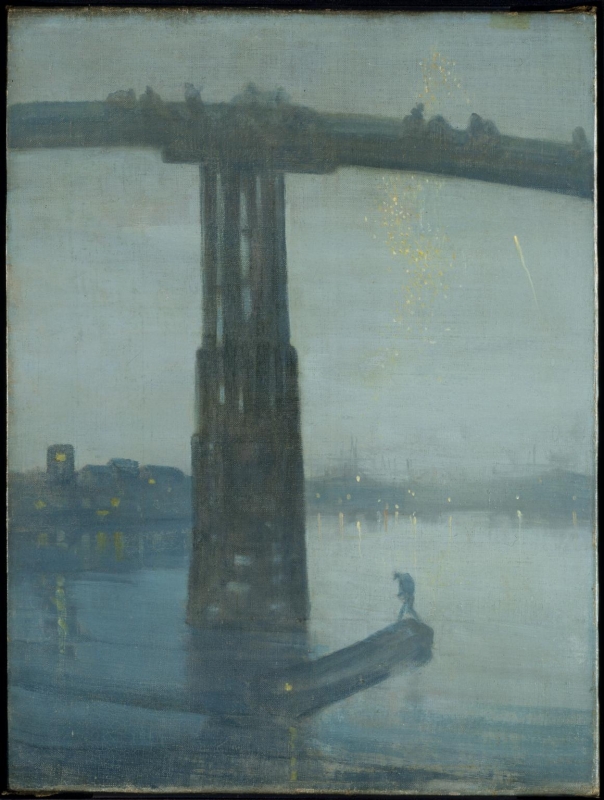Nocturne: Blue and Gold – Old Battersea Bridge probably dates from between 1872 and 1875. 1
It may have been a 'Nocturne in blue and silver' shown in Brighton in 1875, but this is not certain. In February 1876, Whistler was reported as having 'lately completed three interesting studies of landscape', one of which was almost certainly Nocturne: Blue and Gold – Old Battersea Bridge, which was described as:
'moonlight on the river ... In the foreground the dark forms of the pier and parapet of the bridge break across the scene and throw it into a fairy-like distance, while from beneath the bridge a barge drifts forward with the tide into the azure expanse of water that is starred by the golden lights reflected from the houses upon its banks.' 2
Although Nocturne: Blue and Gold – Old Battersea Bridge was described as being 'lately completed' on 19 February 1876, it may have been begun as early as two to three years before, after the completion of Blue and Silver: Screen, with Old Battersea Bridge [YMSM 139], which shows essentially the same subject and which Whistler himself said he was finishing on 20 December 1872.
The view in Nocturne: Blue and Gold - Old Battersea Bridge [YMSM 140] shows the Albert Bridge in the background, possibly in the process of construction, but in Blue and Silver: Screen, with Old Battersea Bridge [YMSM 139] the bridge is dark, whereas in Nocturne: Blue and Gold – Old Battersea Bridge it is seen lit up. This suggests that, although Nocturne: Blue and Gold – Old Battersea Bridge may have been conceived at the same time as the Screen, the finishing touches were unlikely to have been added before the Albert Bridge was opened to the public in August 1873. 3
The fact that Whistler called it 'Nocturne in Blue and Silver No. 5' in 1876-1877 suggested to A. McLaren Young that it was painted later than the Nocturnes of the very early 1870s, such as Nocturne: Blue and Silver - Chelsea [YMSM 103]. 4 However, the numbering of 'Nocturnes in blue and silver' was unknown before Nocturne: Blue and Gold - Old Battersea Bridge [YMSM 140], which became the first 'Nocturne in Blue and Silver' to be recorded as part of a numbered series. The next to be recorded was designated the third in the series, Nocturne in Blue and Silver [YMSM 118], in 1878. 5 Nocturne: Blue and Silver - Chelsea [YMSM 103] may have been the 'Nocturne en bleu et argent, No. 1' exhibited with Les XX in Brussels in 1884 (cat. no. 2), but this is not certain. Neither Whistler's titles nor numbering can be relied upon.
Notes:
1: YMSM 1980 [more] (cat. no. 140).
2: Rossetti 1876, Art Monthly Review [more] , p. 15.
3: Matthews, Peter, London's Bridges, Oxford, 2008, p. 72. See also The new Albert Bridge, seen through old Battersea Bridge [M.0480].
4: Young, A. McLaren, James McNeill Whistler, Arts Council Gallery, London, and Knoedler Galleries, New York, 1960 (cat. no. 35).
5: Whistler to J. Anderson Rose, [November 1878], GUW #08784.
Last updated: 8th June 2021 by Margaret






